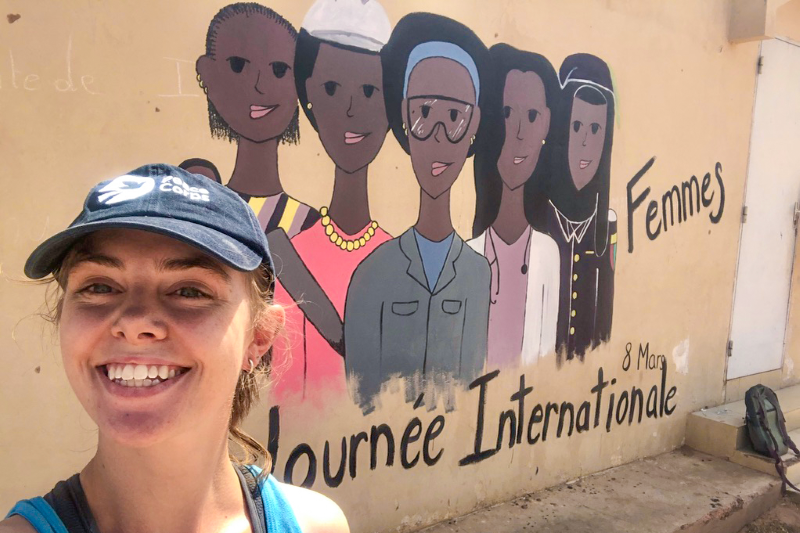-

Hear from Professor Monica Toft
Learn how Professor Monica Toft is shaping the study of global affairs and diplomacy at Fletcher.
Hear from Prof. Toft -

Explore Fletcher academics in action
Fletcher Features offers insights, innovation, stories and expertise by scholars.
Get global insights -
Get application tips right from the source
Learn tips, tricks, and behind-the-scenes insights on applying to Fletcher from our admissions counselors.
Hear from Admissions -

Research that the world is talking about
Stay up to date on the latest research, innovation, and thought leadership from our newsroom.
Stay informed -
Meet Fletcherites and their stories
Get to know our vibrant community through news stories highlighting faculty, students, and alumni.
Meet Fletcherites -

Forge your future after Fletcher
Watch to see how Fletcher prepares global thinkers for success across industries.
See the impact -

Global insights and expertise, on demand.
Need a global affairs expert for a timely and insightful take? Fletcher faculty are available for media inquiries.
Get in Touch
Senegal, Service and a PhD: An Unconventional Road to Global Impact
After serving in Senegal, Emily Ruhm came to Fletcher to research gender and food security

For years, Emily Ruhm FG29 knew the Peace Corps was a powerful place to explore work in international affairs. Initially curious about work in economic development, Ruhm could not have predicted how her work would ultimately lead her to research gender and food security in a doctoral program.
As an undergraduate at William & Mary, Ruhm completed a dual degree and earned her Master’s in Public Policy, equipping her with the tools to dive into a career in international development. One summer, she interned with USAID, and through conversations with staff there, she realized how many people served in the Peace Corps to launch their careers in international development.
Beginning a Career in the Peace Corps
Upon graduation, Ruhm worked in New York at the United Nations World Food Programme, and her experience ignited her interest in the Peace Corps. Learning about the unique challenges that women faced in accessing food and other essential resources, Ruhm saw an incredible power in urban agriculture and accepted an offer with the Peace Corps in Senegal.
“My boss had started to identify that I always talked about gender dynamics within our work,” said Ruhm. “She said, ‘You clearly care. You should explore why that matters so much to you.’”
“By the time I went to Senegal, I was starting to really think about how important it is to prioritize engagement with women and girls in the community,” she added.
Ruhm’s Peace Corps term began in September 2019. As an urban agriculture volunteer in the northeast of Senegal in the Sahel region, she explored ways to uplift women and girls in the community. Through her work at a primary school, she helped run the English club. The school formerly had an agriculture club and a girls' club, both of which Ruhm assisted in re-enlivening.
Ruhm also partnered with local women’s groups and saw that many women in the community grouped together to cultivate large-scale gardens, while men typically tended livestock. Fresh produce came from these gardens, and Ruhm began planning a training program to support these local agriculture efforts. Her plans were interrupted by the pandemic, however, when she and her cohort were evacuated.
“I was starting to enter this world of food security, but wanting to understand those gender dynamics was starting to shape my work at that time,” Ruhm said. “I think that ultimately led me to where I am at Fletcher.”
A PhD Program for Interdisciplinary Study
Ruhm returned to the United States in March 2020, where she continued her work in international development with the Millennium Challenge Corporation and the World Food Program. As she reflected upon the lessons of her work in Lesotho and Nigeria, Ruhm wanted to explore issues of gender and food security in greater depth through a doctoral degree.
“I started to realize I wanted to do more on the humanitarian side, rather than the development side,” Ruhm said.
When she began researching PhD programs, she reached out to Research Professor Dyan Mazurana, now her advisor, to learn more about Fletcher.
“She replied to my email in five minutes,” said Ruhm. “She said, ‘Your research is perfect for what I like my students to engage in.’ We had an incredible call, and it was a big green flag for me.”
“When I was applying to PhD programs, I was asking myself whether I wanted to lean in and pursue a PhD in gender or complete a PhD in humanitarian work and bring a gender lens to it,” she added. “Seeing that I could combine gender and humanitarian work at Fletcher was huge.”
Research for the Common Good
As she’s begun her doctoral studies, Ruhm has maintained the ethos that has presided over all of her work – untangling complex issues so that she can help solve real problems that people face.
“I had one PhD interview where they told me, ‘You don't have to actually solve the problem in your research.’ And I wondered, ‘Why would I spend five years of my life to understand what’s working and not address the problem I'm researching?’”
“At Fletcher, my experience has been the opposite. Professor Mazurana is of a similar mindset – what’s the point of doing research if you’re not trying to actually implement change?”
Read more about Fletcher’s PhD programs.

